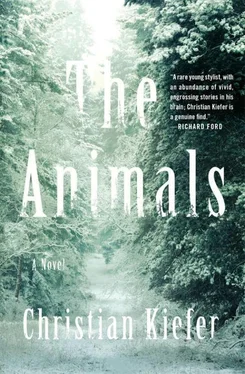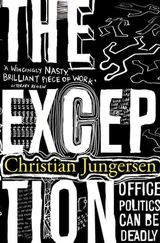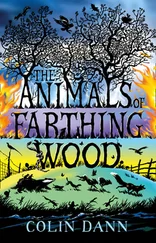That is the winter when you first begin breaking into houses. It begins when you knock on the door of Mark Matthews’s house, a tiny boxlike structure covered in peeling light-blue paint, and there is no answer and somehow you decide to go around to the back door and knock there and when there is still no answer you open it and enter. Hello? Hello? Rick calls. You walk through the house quickly, moving through each room, not really sure what you are looking for once you are inside and not really intending to look for anything either, because you have not yet decided why you went inside the house at all.
You both know Mark Matthews so you do not feel like you are somewhere you should not be even though you both know that what you are doing is forbidden, perhaps even a crime, whether you know the occupant or not. And yet being there without Mark Matthews makes the whole home seem foreign somehow. A bowl of fake plastic grapes on the kitchen table. A console television. A small bronze cannon by the fireplace. A few magazines stacked on the floor next to the sofa. You make two peanut butter and jelly sandwiches on white bread and you and Rick sit at the kitchen table and eat them, listening all the while for the sound of a car from the front of the house. From the street outside comes the sound of a passing pickup truck and for a moment you are sure it is your brother’s, but of course there is no possibility of such an occurrence and in the seconds afterward you are nearly crushed by an inexpressible wave of grief.
You take a small necklace from Mark’s mother’s chest of drawers and Rick takes a shining green ring. They are souvenirs of a sort, a reminder of what was, for you, a strange electricity that seemed to temporarily fill the huge vacancy that still rides in your chest.
Then there are other houses, no longer people you know but the houses, the homes, of strangers. When the back door of the first house you try is locked, Rick breaks the knob off with a brick and presses the door open. Neither of you take anything this time, although you will begin taking small items from each home you enter, mostly jewelry and cash, but that first time you only move through the small dingy rooms before passing once more through the rear door and into the fenced square of the backyard. From a few yards over — each a square of dead grass mottled with frozen dirt — a neighbor’s dog barks at you lethargically. Beyond it, the flat plain of the desert floor is slowly erased by a faint pale drift of new snow.
What you learn over the course of that winter is that the worlds people draw for themselves are different. Sometimes the details of those lives are told in cheap scratched frames that stand upon countertops or hang from bent nails upon the walls, photographs that are sometimes of people you recognize — a teacher at the high school or the man who makes hamburgers at the Pak-Out or the woman who works at the bank — and the collection of those memories seems to transpire in the air all around you. The teacher on a beach somewhere with a woman so beautiful that the two of you have trouble pulling yourselves away. The man who owns the Pak-Out as a boy no older than you are, fishing pole in hand, the familiar stretch of the river you know as Catfish Bend curling behind him. In such moments it feels as if the structure of each home is made entirely of gauze and you have entered those enclosures as if entering into a dream. The thin and spectral webs of spiders. Of root and fungus. Intersecting bubbles on the still surface of a pond. You know now that what world you occupy is in the process of dissolving. As if you are dreaming and are dreaming within that dream so that it matters not whether you sleep or wake, for there is no world in which your brother is not dead.
HE TALKED TO HIMSELF AS HE DROVE, HIS VOICE A SLOW, NEARLY silent murmur, big trees sliding by at the edges of the highway and then the first ramshackle buildings of the town beginning to appear. He had been thinking about that day when they first met and that memory had sparked another and another. He could not have imagined ever being apart in those days, in the hot desert of his childhood. He could not have imagined a bridge from there to here, and yet here he was, driving toward the one person he had hoped — in the agonized guilt of what had happened, of what he had done — that he would never have to lay eyes upon again, even though he knew all the while that he would return, his voice in the car riding the same accusation: Why else would you have kept the safe for all those years? You might have rid yourself of it at any time but you never did and now
here you are.
He parked the truck at the edge of the Safeway parking lot and sat there with the motor idling, still talking softly to himself and staring around at the various cars — dirty Subarus and pickups — for any sign of the man who had once been his best friend in all the world, willing himself to stay there only because he thought the cargo he held in the bed of the truck would be the end of it, would close that one part of his past that he had left flapping open. The last thing tethering him to the world he had fled.
When he saw Rick at last his first thought was that he had come to look like his father, the man who, when they were children, would beat him and his mother until their screaming at last brought the sheriff into the trailer park. The resemblance filled him with a sadness impossible to articulate. He did not know what he had expected after so many years, but not this tiny broken car, not this filthy yellow Honda, its fenders rusted into holes and the door squealing on its metal hinges. And yet here he was in the parking lot of the grocery store, his body the same lanky frame protected only by a loose denim jacket insufficient for the cold and jeans that rolled down over the tops of scuffed cowboy boots.
Bill stepped out onto the asphalt. Hey, he said.
Rick stood there by the car’s open door, staring back at him, his face inscrutable. The years had streaked his black hair with gray.
I bet you’re glad to be out.
So there you are, Rick said at last. The voice the same. The eyes sparking blue in the freezing air.
Here I am.
Across the expanse of the parking lot, the Safeway sign glowed dim under a sky rolling with dark clouds. Pickup trucks in rows. A maroon sedan passing slowly, the driver nodding as they made eye contact.
That a cop?
Just someone from here in town.
Rick’s eyes followed the car and then turned back to where Bill stood beside the pickup.
You’re gonna have to follow me, Bill said.
No way.
There’re too many people here. Follow me.
I’m not following you anywhere.
You’re gonna have to, Bill said, and before Rick could react he slid back into the cab of the pickup and gunned out of the parking lot, his heart pounding, hands gripping the wheel so tightly that he had to will them to uncurl when he turned onto the street. He looked into the rearview mirror and saw nothing but the anonymous vehicles of his neighbors. Come on, he said. Come on. His breath stilled, stopped. And then at last the tiny yellow car appeared from the receding parking lot and swung onto the road behind him.
The figure in the mirror: a ghost from his memory. Even at this distance Rick looked like his father. The angular shape of his face had hardened and weathered like the desert itself, implacable, lines running under his eyes and the eyes themselves drooping at their most distant and downward edges, wet and clear and wide. There he was. There he really was.
He followed the highway south out of town, through the Kootenai’s broad, flat floodplain to where that valley pinched closed into a folded landscape of ridges and pines, scraps of cloud drifting between them like foam on some inland sea. He checked the mirror again and again, as if the yellow car might, at any moment, evaporate in a cloud of steam like his own exhaled breath. Because he wanted to be shut of it. He needed to be shut of it. And so he needed the yellow car to be there, to be following him as the forest hemmed in the road once more and their route was reduced to shadow.
Читать дальше












